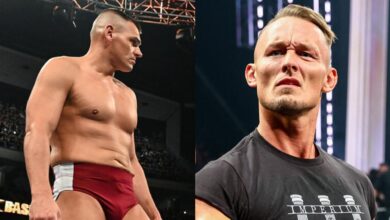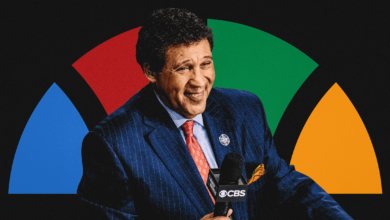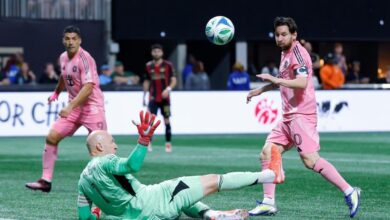Miami football and Mario Cristobal remain a perfect pairing

CORAL GABLES, Fla. — In the middle of the toughest professional decision of his life, Mario Cristobal dialed a familiar phone number.
Over 3,000 miles from Eugene, Oregon, in Stuart, Florida, Dennis Lavelle picked up. Cristobal wanted to know what his former high school coach at Christopher Columbus High thought of the move that, at that point, Lavelle had only heard rumors about: Cristobal’s potential return to Miami as the Hurricanes’ new head coach.
“You’re 51 years old now,” Lavelle told Cristobal. “And you got a chance to go home. … You got to go.”
Lavelle’s voice was more affirmation than anything. From an institutional standpoint, everything had to be right at Miami for Cristobal to come back to the place he grew up and won national championships in 1989 and 1991. But outside of the white lines, the gravitational pull of family, culture, tradition and history carried a significance that has only become more evident as Cristobal has settled into his new digs.
“He’s got his Cuban coffee, his arroz con pollo and flan, and all that stuff,” Lavelle said. “He’s in heaven.”
It’s true that Cristobal wanted this. He even once told former Hurricanes coach Butch Davis that his ultimate goal was to have the job Davis had. But the reality still feels surreal for a kid of Cuban exiles who made an effort to send him and his brother Luis to a private school like Columbus. There, he spent his time after practice driving or biking to Miami practices with his friend and now fellow coach Alex Mirabal. Back then, the two envisioned a path stitched together by childhood dreams. Now, the duo hatch game plans together inside buildings that commemorate the players who drew them to those practices in the first place.
“You remember the simplicity of things,” Mirabal said. “Now there’s just excitement of someone who has embraced the city, and the city has embraced him because it raised him.”
It will take a whole lot more than nostalgia, culture and connection to bring the U back to its glory days, but spend some time talking to people in the city, around the program and who know Cristobal best, and it’s already clear that any future success will carry more than just the traditional weight of winning at a program with high expectations.
“I think it is a source of pride for the community,” Luis said. “Not just that he’s Cuban American, but that he was born here, raised here, that he speaks Spanish, that he played high school here and won [national] titles here.”
As current Columbus High head coach Dave Dunn put it: “The prodigal son that returns is more popular than the prodigal son that never left.”
CLARA CRISTOBAL WAS known as the soul of the Cristobal family. She was the sweet, but tough, old-school Cuban mom who would cook in droves to feed linemen at her house, the one whose ropa vieja would make Mirabal prefer having dinner at the Cristobal house over his, and the glue that held the Cristobal family together. It’s why her son Luis Cristobal called the period when she was fighting through health issues that worsened last year after she suffered a fall “the most difficult time in our lives.”
It was after that fall in November that Cristobal took a short trip back to Miami following Oregon‘s win over Oregon State to be with his mom and the rest of the family. As Luis explained, Mario made the trip on a week when Oregon had to prepare for the Pac-12 title game because the family thought she didn’t have much time left.
“She managed to hang on,” Luis said through tears. “It wasn’t her time, and that gave us some hope.”
As the possibility of Mario coming home to be the head coach at Miami gathered steam, the family back home tried to balance that with the reality of Clara’s health. The circumstances had added more weight to the ensuing opportunity Mario had, but it also required some difficult choices.
“When you go away, you tuck [the connection to home] away, because it’s still about the vocation of being a football coach,” Cristobal said. “And I just did not ever think it would really be a reality. So when it became a reality, it hit like a ton of bricks.”
“It was hard given the relationships that he and we built [at Oregon],” said Luis, who played at both Columbus and Miami and is a retired police officer. “But at the same time, come on. It was his dream job, it was a no-brainer. Upon reflecting on it by myself, I was like, Wow, yeah, of course.”
After taking the job at Miami, Cristobal was able to do something he wasn’t able to in Eugene. Following long days of practice, meetings and work, he’d head home and make a stop at Kindred Hospital down the road from campus to see his mom.
“She was always worried about him being so far away,” Mirabal said. “She was happy that he was doing well, but it was good that he was able to be here for the last few months. That was big for him.”
Clara remained stable, according to Luis, until one day in March when she peacefully died.
“I know it was very hard on all of us,” Luis said. “Mario was here, which was special, but he did what we’ve been taught to do: Do your job.”
Even through Clara’s wake, memorial and burial, those around Cristobal never noticed a change in their head coach nor any absences.
“People were taken aback by that,” Luis said. “But no, no, you don’t understand, that’s how we’re wired, that’s how we grew up and that’s what she would have wanted.”
By now, the Cristobals’ story is well-known. Mario’s dad, Luis Sr., was a political prisoner in Cuba who made his way to South Florida where he met Clara, also a Cuban exile. The two started a family and made Miami a temporary home.
“That first wave of Cubans kind of built Miami,” said Joaquin Gonzalez, a Cuban American who was a lineman at Columbus and at Miami when Mario was a graduate assistant. “But the difference between them and immigrants is they thought they were going to go back, so that’s how they raised their kids. Sacrifice and hard work was instilled in that generation.”
Mirabal is quick to point out, however, that even though family is everything in Cuban American culture, his and Mario’s move to Miami was about more than that. Being close to family and to the place where they grew up is just “icing on top of the cake.”
“Those things are important,” Mario said regarding what role the family, and his mom, played in the move. “But the real factor, the real, the No. 1 determining factor was that I wore this helmet, and I wore this uniform … and that’s different. And that will always be different.”
ONCE EVERY FEW weeks, Gonzalez will take out his phone and send a text to a group chat that includes his closest football friends, some of whom played at Miami or Columbus High, including Mario’s older brother Luis.
“By the way, did you guys realize that Mario is the head coach of the University of Miami?”
For Gonzalez, the reality still hasn’t fully set in. He played at the U when Mario first returned as a grad assistant to help coach the offensive line, but knew the Cristobal family going back to the early 1980s, when his older brother and Luis struck up a friendship that extended to their families. Gonzalez was among the former players who made a point to meet with Miami leadership, including president Julio Frenk, to implore them to not only hire Cristobal, but ensure that he was provided the resources to succeed.
“We always thought that this could happen but we doubted whether it ever would,” Gonzalez said, overlooking the practice field at Columbus, where his son now plays quarterback for the JV team. “It is a f—ing dream come true for him.”
While his parents may have thought they would one day go back to Cuba, Miami became the place Mario boomeranged back to throughout his early coaching career. After being a grad assistant at Miami from 1998 to 2000, he became the offensive line coach at Rutgers from 2001 to 2003, only to return to Miami as the tight ends and offensive line coach from 2004 to 2006. Florida International University gave him his first head-coaching job in 2007 but fired him in 2012 after going 27-47. That led to Mario ending up at Alabama, where he was an associate head coach and coached tight ends. There, he learned under Nick Saban until 2016, when Oregon gave him his second shot at running a program. Cristobal went 35-13 and rebuilt the Ducks program, proving his bona fides as a head coach.
“This guy, his dad wasn’t a head coach, he wasn’t born with a silver spoon,” Gonzalez said. “His story is Cuban. It wasn’t like he walked into being an offensive line coach, he had to cut his teeth, and I’m not saying that Miami is gonna be easy. But I will tell you his work ethic, man, it’s exactly what this program needs.”
Both Gonzalez and his former teammate Brett Romberg remember Mario as the intense grad assistant who would get on their cases for how out of shape they were, make fun of them in Spanish and crush protein bars, shakes and film on a daily basis while applying judo and martial arts techniques to offensive line play. To them, it was evident back then that Mario had the intensity and drive to one day be a head coach.
“It’s almost like embedded in [Cuban] families and that culture of ‘we’re going to make you stronger, both mentally and physically, not only by pushing your buttons, but also by seeing how far we can take you in the insult category,'” said Romberg, whose wife is Cuban American. “I’m always surprised about how everything is so geared towards the culture here in this city. It makes it very special. So Mario, obviously being a Cuban American, that’s huge.”
For former Hurricanes wide receiver Randal Hill, the cultural connection is secondary to the fact that he was in a huddle with Mario and trusts him to lead the program back to the top. The culture that resonates with Hill, as he puts it, isn’t about Mario or any coach being Cuban, Black or white, but rather what they can do to return Miami to the kind of success he experienced and the program came to embody in its glory days.
“He brings a passion to the table,” said Hill, who played on the 1987 and ’89 national title teams. “Mario picked up the phone after he got the job and called me, ‘Where are you at? I need you back out here [at practice]. We need to let people know that you’re still here, that you helped build this and we’re going to do it again.'”
Hill subscribes to the belief that when Miami football is thriving, so does the local community. Despite whatever differences, opinions and conflicts Miami may be dealing with, Hill was a firsthand witness to the effect a successful Hurricanes team had on bringing everyone together. Now, Mario will be tasked with trying to do the same.
“I think that there’s an extra energy and a certain sense of more responsibility on top of him to get this job done,” Gonzalez said. “But it’s not like he needs it.”
THE MIAMI AIR is thick with humidity on a late August morning just one week before Miami kicks off its first season under Cristobal. It’s the time of the year in South Florida when sweating quickly turns from a verb into a constant state of being. For players having to concern themselves with coverages and drills as they swelter underneath layers of pads and jerseys, this has become the norm. For Cristobal, this, among many other things he has experienced since his arrival in Coral Gables, feels like home.
Going to pick up food at Chicken Kitchen, a local restaurant, feels like home. Running into old friends, including his little league coach, makes it feel like home. Not having to use a GPS to get around the city because he knows all the routes and shortcuts feels like home. Perfecting Cuban coffee with his in-office machine and introducing it to coaches and others who are not from Miami, it all feels like home — even if Luis worries about the lack of sleep and amount of cafecitos he drinks.
“I was concerned that he wasn’t sleeping when he first got here,” Luis said. “He still isn’t, just fueled by Cuban coffee.”
“Cafecito is in his blood,” Mirabal adds.
After practice is over, Mario heads over to the corner store near campus to show what goes into a proper cafecito. After ordering the Cuban coffee inside the store along with tostadas (toasted bread and butter) to dip, Mario points the cafecito toward the camera.
“If you see someone and they can’t get Cuban coffee to froth like that, you have to call them out on it,” Cristobal says. “Then come see me in Miami and I’ll put you on the right spots.”
“Is that Coach Cristobal?” one patron asks. A few others stop in their tracks to take pictures. The apparel store next door has a bright orange sign that reads, “Welcome home, Coach Cristobal. We’re all in,” in all caps.
“It has created a buzz within the Cuban community,” Dunn said, adding that the first time Cristobal came to visit Columbus after taking the job was like the pope walking in. “He’s one of their own, he grew up in the streets, went to the school in the neighborhood and went to school right down the street. Now he’s head coach at that school right down the street.”
Players have taken notice too. Wide receiver Xavier Restrepo, whose family is from the South Florida area, said he’s constantly seeing fans on Twitter riding for Cristobal in Spanish.
“It feels like a huge cultural force that is behind us,” sophomore linebacker Corey Flagg Jr. said.
It may be a small detail, but the fact that Cristobal can dip in and out of Spanish as easily as most Cuban Americans in Miami means something too. When Gonzalez first met Cristobal’s predecessor, it was notable to Gonzalez that he didn’t speak Spanish. “That was strike one,” Gonzalez said.
Walk around Miami and you’ll soon realize Spanish is the default. The language you hear more often than not on the streets, in cars and in restaurants underlines the kind of community Miami is. Even Columbus’ motto is “Adelante,” which means “forward.”
“I don’t think I’ve heard many coaches speak Spanish,” Cristobal said. “That’s one thing I take pride in. I’m one of those coaches that actually speaks Spanish, that was my first language.”
So it wasn’t a surprise when, at his opening news conference, not only did Cristobal speak Spanish, but, as Romberg put it, several of the Cuban American families and Latino families connected to Cristobal, and the university showed up in support.
“I’ve never seen so many Latinos at a football press conference,” Romberg said with a laugh. “Or that much linen.”
There’s a belief among those who have seen or been a part of the glory days of Hurricanes football that the team, at its best, is able to bind the city and all its cultures together in support of Miami. And while Mario and Co. are aiming to do that this season and beyond, it can’t be ignored how significant it is for both the Cuban community and former Miami players that one of their own is leading the charge.
“In Miami, Cuban is the dominant culture,” Lavelle said. “And he’s coming back in the prime of his working life, to be the central figure in that culture. I mean, that’s got value. To me, that’s got value that you can’t put a price on.”
ON A NIGHT some time after Cristobal’s hiring, Lavelle was home when he got another call. This one was a FaceTime from Cristobal and Alonzo Highsmith, a Columbus and Miami alum who was hired as the team’s general manager in May. They were both in Cristobal’s office and he wanted to check in with their former coach.
“They just called to tease me,” Lavelle said with a chuckle. “No, it was fun, it was very cool to see them both there.”
The three shared laughs as they remembered the past and marveled at the present. To this day, Cristobal credits Lavelle first and foremost for setting up his future in football and modeling what a head coach should be for him.
Now, here Cristobal was, at the ultimate stop of his long journey, the head coach of the University of Miami, showing Lavelle the school’s latest investment into the program since his arrival: preliminary renderings of the Hurricanes new practice facility.
“It felt like the right time for him to come back to Miami,” Lavelle said. “I told my wife the other day, ‘If Mario wins at Miami at that level in his home, it’ll be like a storybook.'”
Source link





